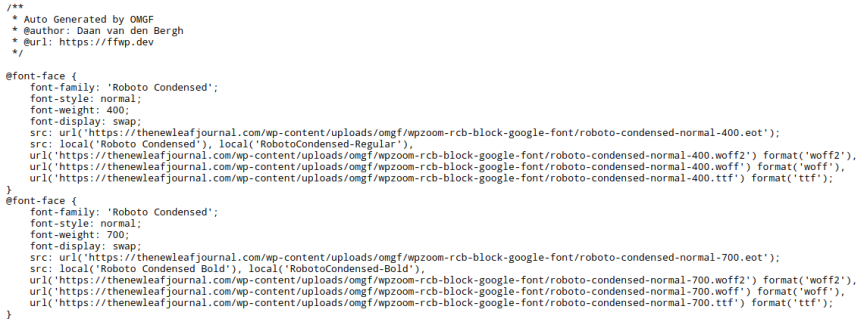(April 11, 2022 Update: As of April 2022, we are using a system font stack instead of hosting fonts locally. However, OMGF works well and I recommend it as an easy solution for hosting fonts locally on WordPress. The rest of this article remains unchanged from its original publication.)
Today, I bring you news about an exciting under-the-hood improvement at The New Leaf Journal that I had been meaning to implement for a while.
At The New Leaf Journal, we use two free Google fonts on our site. The title text is IM Double Fell Pica. The rest of the text on site is Gentium Book Basic. Now forgive me for my lack of technical acumen, but until now, our site requested the fonts from an external source whenever you loaded a page at The New Leaf Journal.
Yesterday, I finally set up a WordPress plugin called OMGF | Host Google Fonts Locally, created by the Daan van den Bergh, a web developer. Please note that we are using the free version of the plugin instead of the paid premium version.
After installing the plugin, I reviewed the instructions and information before checking the configuration in its settings and proceedings. With a press of a button, the plugin loaded style sheets for the fonts we use here at The New Leaf Journal, so now our site no longer needs to look to any external source to produce the fonts for your reading.

Hosting Google Fonts locally has two benefits. For one, it will – with hope – slightly improve our page loading times. My initial page speed tests did indicate a slight improvement, although it is not one that you are likely to notice. For two, hosting Google Fonts locally is a more privacy-friendly way of showing our content. As Mr. van den Bergh notes, the plugin allows us to display fonts in a way that is “100% GDPR compliant,” referring to the strict internet privacy protection laws of the European Union. Hosting Google Fonts locally follows from my earlier decision to switch our analytics system from Google Analytics to Koko Analytics, which keeps limited information about the number of page views we receive on our site without relying on external sources.
Thus far, the transition to hosting Google Fonts locally appears to working seamlessly and having a positive effect on site performance. I thank Mr. van den Bergh for providing an easy solution to help those of us who cannot write code accomplish what would otherwise be a complicated task. I first became interested in trying his plugin after studying his blog during the summer to learn a variety of methods for improving our site’s performance.
I hope you continue to enjoy The New Leaf Journal – now with local fonts. I will provide further updates on our efforts to improve the site as I implement them. I hope that I will soon have good news about having removed the annoying Pinterest tracker – which is now the final negative tracker caught by Privacy Badger on our site.
Please note that this is not a review, but a description of my experience with the plugin thus far. If you spot any issues with the site’s performance, please let us know by using our contact form.